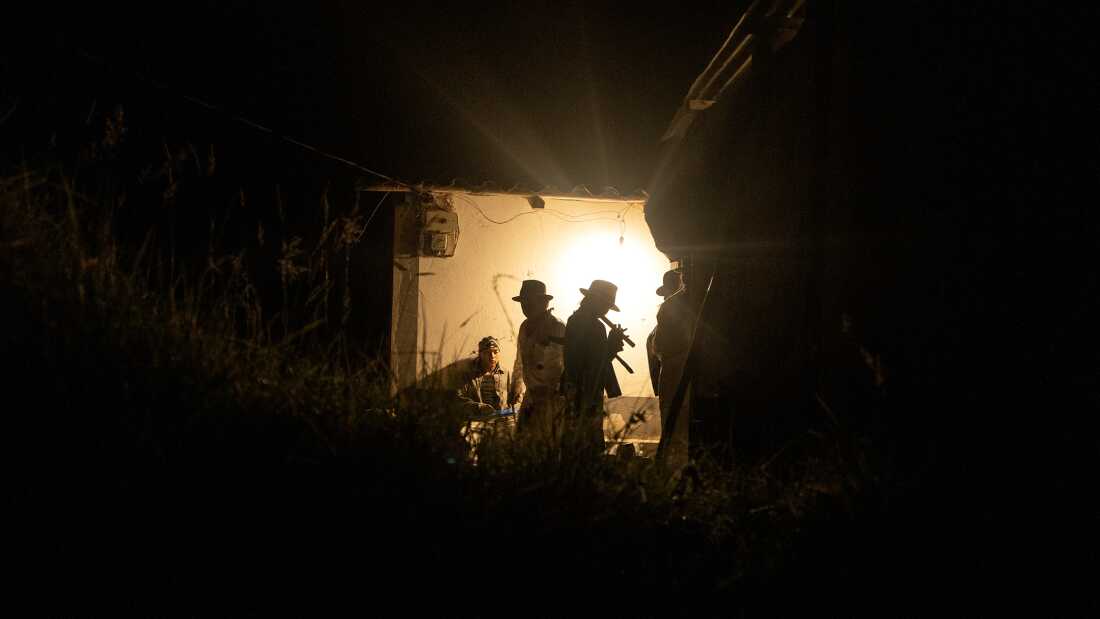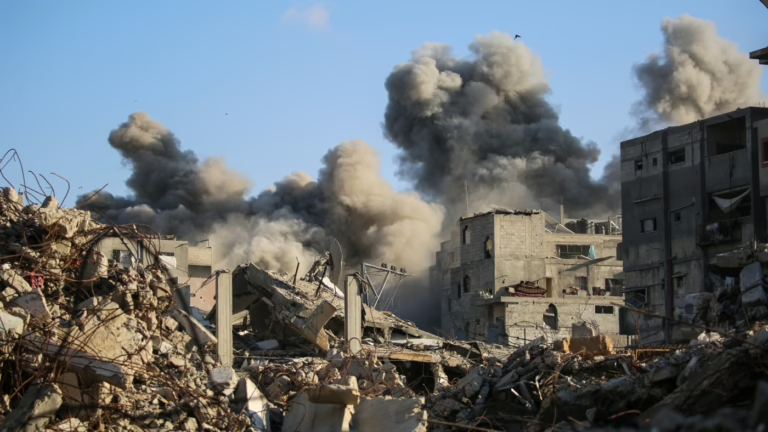Good morning. Welcome to the Up First newsletter. Subscribe here to receive it directly in your inbox, and tune in to the Up First podcast for the essential news to kickstart your day.
Top Headlines Today
The Gaza ceasefire faced a serious challenge this weekend after Israel launched a military operation in response to an attack on its forces. On Sunday, the Israeli Defense Forces reported that “terrorists” targeted soldiers near Rafah, resulting in the deaths of two Israeli troops. Hamas has denied any involvement in the incident. Meanwhile, Gaza authorities report that Israeli airstrikes killed dozens of people. Both parties accuse each other of breaching the ceasefire agreement mediated by the United States.
Smoke rises following an Israeli airstrike targeting a structure in the Bureij refugee camp in central Gaza on October 19. Gaza’s civil defense reported that a series of Israeli strikes on this day resulted in at least 11 fatalities across the region, as both Israel and Hamas blamed each other for violating the ceasefire.
Eyad Baba/AFP via Getty Images
- 🎧 Yesterday’s events represent the most significant strain on the ceasefire since its inception, NPR’s Rob Schmitz reports on Up First. Despite the clashes, both Hamas and Israel affirm their commitment to maintaining the ceasefire’s intent. U.S. Special Envoy Steve Witkoff and Jared Kushner, senior advisor to former President Trump, are arriving in Israel today, with Vice President JD Vance expected tomorrow, aiming to revive the ceasefire negotiations. Their mission includes facilitating the return of the remaining Israeli hostage remains, a critical step in the agreement’s initial phase.
The government shutdown has now stretched into its 20th day without meaningful progress toward resolution. The longest shutdown in U.S. history lasted 35 days during President Trump’s first term. However, this current impasse differs as the urgency to reach a deal is diminished, partly because the shutdown’s effects are not yet widely felt, NPR’s Deirdre Walsh explains.
- 🎧 Rather than yielding under pressure from stalled projects, Democrats are standing firm, viewing this as a continuation of tactics used by the Trump administration before the shutdown began. The Senate has rejected a House-passed temporary funding bill ten times. Another vote is scheduled for tonight, with Senate Democrats expected to block the measure again, insisting on extending expiring health care subsidies through the end of the year.
The U.S. government plans to halt all subsidies to Colombia and impose new tariffs following Colombian President Gustavo Petro’s condemnation of U.S. strikes on vessels from Venezuela, which he described as acts of murder. The U.S. military has destroyed boats in international waters as part of a counternarcotics campaign.
- 🎧 The U.S. claims to have targeted at least seven drug-laden vessels bound for American shores, NPR’s Eyder Peralta notes. This marks a rare direct military intervention in the Western Hemisphere, heightening regional tensions. Trinidadian fisherman Renute Roberts reports hearing drones overhead at night. While acknowledging the drug problem, Roberts believes there are less aggressive ways to address it than bombing boats.
Cost of Living

As health insurance premiums soar, some employers are stepping up to cover their workers’ medical plans.
Getty Images/Emily Bogle/NPR
NPR’s ongoing series, Cost of Living: The Price We Pay, explores the factors behind rising expenses and how Americans are adapting after persistent inflation.
Healthcare in the U.S. remains the priciest among developed nations, with costs continuing to climb. In 2023, the average yearly premium for employer-sponsored family health insurance exceeded $25,500. Employers typically cover about $19,200 of this amount, with employees paying the remainder. Since 2019, premiums have surged by over 24%, and further increases are anticipated next year. The impact on individuals and businesses includes:
- ⚕️ Pharmaceutical companies, hospitals, insurers, and other profit-driven entities have significantly contributed to rising healthcare expenses. For instance, while drugmakers are innovating more effective treatments, their prices remain steep.
- ⚕️ Millions of workers receiving insurance through their employers may see their paycheck deductions rise by an average of 6% to 7% in the coming year.
- ⚕️ Some employers are absorbing the full cost of insurance premiums. Offering no-cost health coverage can attract talent, reduce employee turnover, and allow workers to focus on their jobs rather than financial worries.
Discover more about corporate efforts to ease health insurance costs by listening to NPR’s coverage or joining the conversation. Upcoming installments will examine the rising prices of leisure activities, such as sports event tickets. Stay informed with the latest updates here.
How have rising prices affected your lifestyle? Share your experience by filling out this form to contribute your story to NPR.
Photo Feature

Festivities of San Juanes in Cotacachi, located in Ecuador’s Imbabura province. The Andean Cumbia blends indigenous northern rhythms like San Juanitos, performed during these celebrations, with Colombian cumbia influences.
Karla Gachet
Cumbia Across Latin America is a photographic exploration highlighting the communities, traditions, and environments that sustain this vibrant musical style across six nations.
The earliest recorded cumbia in Ecuador dates back to the 1960s with the song “Cumbia Triste,” penned by Polibio Mayorga. This track fused the traditional Andean San Juanito rhythms with rural Colombian cumbia, introduced through the music industry. This fusion helped forge a new cultural identity for migrants settling in Ecuador’s cities. Mayorga’s pioneering work paved the way for artists like Medardo Luzuriaga, who propelled Ecuadorian cumbia to national prominence. Luzuriaga produced over 100 albums, and his iconic cumbias remain deeply embedded in the country’s cultural memory. Explore more about Ecuador’s role in shaping this genre and view related cultural imagery. The article is also available in Spanish.
Three Key Updates Before You Go

Sam Rivers, bassist for Limp Bizkit, performing at the KROQ Weenie Roast & Luau in Dana Point, California, June 2019.
Kevin Winter/Getty Images for KROQ
- Sam Rivers, the bassist for the rock group Limp Bizkit, has passed away at 48. The band shared on social media, “Today we lost our brother.”
- Yesterday morning, the Louvre Museum in Paris was targeted in a theft. Authorities are searching for four suspects who escaped with priceless jewels.
- OpenAI has restricted users from creating videos of Martin Luther King Jr. on its Sora app after his estate raised concerns about disrespectful deepfake content. Since the app’s launch three weeks ago, users have generated hyper-realistic videos depicting King making offensive and racist remarks.
This newsletter was edited by Obed Manuel.





















